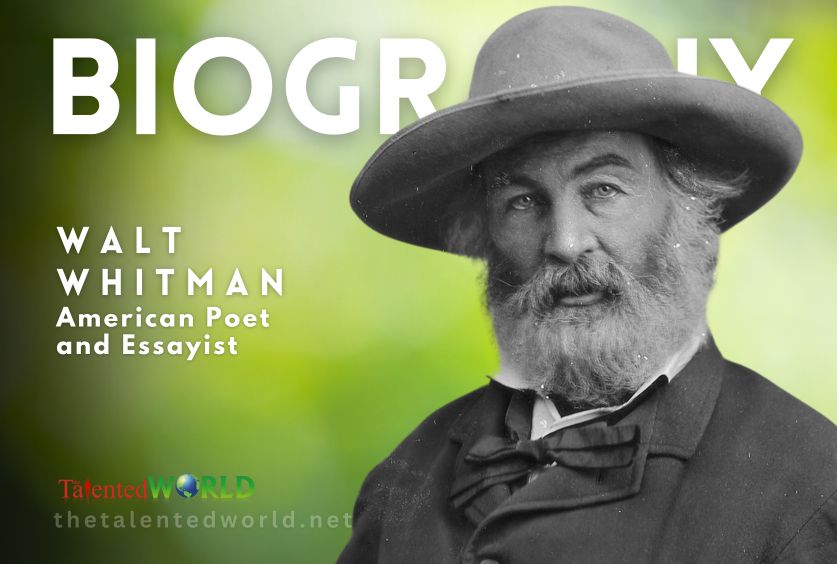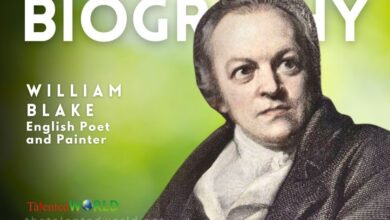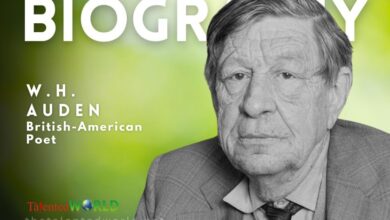
Quick Facts
| Fact | Details |
|---|---|
| Full Name | Walter Whitman Jr. |
| Date of Birth | May 31, 1819 |
| Place of Birth | Huntington, New York, U.S. |
| Date of Death | March 26, 1892 |
| Place of Death | Camden, New Jersey, U.S. |
| Occupation | Poet, essayist, journalist |
| Notable Works | – Leaves of Grass (1855) – “O Captain! My Captain!” – “When Lilacs Last in the Dooryard Bloom’d” |
| Literary Contributions | Considered one of the most influential poets in American literature; often called the father of free verse; incorporated transcendentalism and realism in his writings |
| Controversy | His poetry collection Leaves of Grass (1855) was controversial in his time for its overt sensuality, described by some as obscene |
| Childhood and Career | – Born in Huntington, lived in Brooklyn – Left formal schooling at 11 to work – Worked as a journalist, teacher, and government clerk |
| Leaves of Grass | His major poetry collection, first published in 1855; financed with his own money; continued expanding and revising until his death |
| Civil War Involvement | Went to Washington, D.C., and worked in hospitals caring for the wounded; wrote poems on loss and healing; authored poems on Abraham Lincoln’s assassination |
| Later Life and Death | Suffered a stroke towards the end of his life; and moved to Camden, New Jersey, where his health declined further; the funeral was a public event |
| Influence | Strong influence on poetry; considered essential to understanding America and its civilization |
Walt Whitman Books
| Book Title | Year |
|---|---|
| Leaves of Grass | 1855 |
| Song of Myself | 1855 |
| Poems of Walt Whitman | |
| O Captain! My Captain! | 1865 |
| I Hear America Singing | 1860 |
| Poèmes de Walt Whitman | 1868 |
| I Sing the Body Electric | 1855 |
| Passage to India | 1871 |
| Song of the Open Road | 1856 |
| A Noiseless Patient Spider | 1868 |
| Crossing Brooklyn Ferry | 1856 |
| Out of the Cradle Endlessly Rocking | |
| Calamus | |
| Beat! Beat! Drums! | |
| Pioneers! O Pioneers! | 1865 |
| Short Poems of Walt Whitman | |
| Drum-Taps | 1865 |
| The Wound Dresser | 1865 |
| When Lilacs Last in the Dooryard Bloom’d | 1865 |
| Walt Whitman and the Civil War | 1933 |
| Walt Whitman, Best Poems | |
| Liście Traw | 1855 |
| Prose-Specimen Days and Collect | 1882 |
| One’s Self I Sing | 1867 |
| Walt Whitmans Werk | |
| Whitman and Dickinson | |
| There Was a Child Went Forth | 1855 |
| Democratic Vistas | 1871 |
| The Open Road | |
| The Complete Poems | |
| Out of the Cradle Endlessly Rocking | 1860 |
| Live Oak, with Moss | 1860 |
| The Works of Walt Whitman | |
| The World Below the Brine | |
| Life and Adventures of Jack Engle | 1852 |
| Memoranda during the War | 1875 |
| I Take to the Open Road | |
| Franklin Evans | 1842 |
| Prayer of Columbus | |
| Leaves of Grass (v. 1-3) | |
| Saudação a Walt Whitman | |
| Poems about America | |
| Complete Works | 1881 |
| Sea Drift: For Baritone Solo, Mixed Chorus and Orch | |
| One Hour to Madness and Joy | |
| Manly Health and Training: To Teach the Science of | |
| Patrolling Barnegat | |
| Selected Poems | 1904 |
| Whispers of Heavenly Death (Unabridged) | |
| Dirge For Two Veterans | 1901 |
| Song of Myself, Section 51 (Unabridged) |





